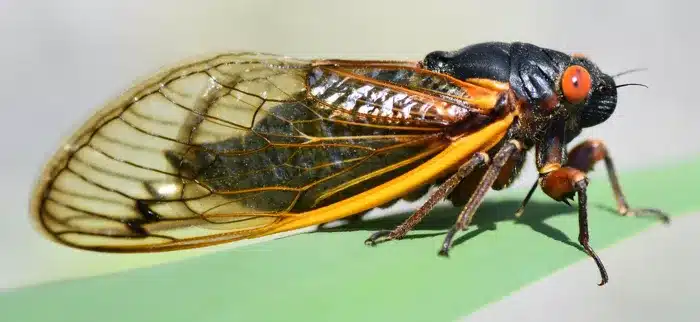This article first appeared on the Magnolia Tribune.

- In the world of insects, the cicada makes the loudest racket, and this year a special phenomenon will occur that will add to the symphony.
What in the world is that noise? Is it an alarm? A siren? At up to 100 decibels, the noise can be as loud as a lawnmower or motorcycle, or even a jackhammer or jet engine.
And this year the noise will be even louder.
In the world of insects, the cicada makes the loudest racket, and this year a special phenomenon will occur that will add to the symphony.
A Primer on Cicadas
Cicadas are arthropods, invertebrates that include other insects, spiders and crustaceans. They begin life as eggs laid on plants that hatch into nymphs and fall to the ground where they burrow a foot or two down and hang out for the next several years. When it’s their time, they will tunnel to the surface where they will reach maturity before beginning their noisy month-long search for a mate.
The male cicada has a distinctive mating song (actually an annoying buzz) and the lady cicadas really seem to dig it. Once they procreate, their work is done. Within a few short weeks they’ll die.
Annual cicadas emerge every year. Dr. Blake Layton, an Extension Entomologist Specialist at Mississippi State, says that Mississippi has about 20 species of annual cicadas, and they vary considerably in size, appearance and sound.
Periodical cicadas emerge every 13 years and only in certain areas. There are three broods of periodical cicadas, all black with orange wings and red eyes. According to Layton, Mississippi is the only state where all three broods occur.
Suitable habitats for the cicadas include hardwood forests, which can support up to a million cicadas per acre. They are herbivores, but unlike the locusts, cicadas don’t eat very much at all, mostly sucking on xylem sap from tree and plant roots when they were underground.
You may notice some fatter birds and squirrels in the coming months, as they love to dine on cicadas.
Rare Double Emergence – The Cicada Comeback Tour
This year, Brood XIX periodical cicadas, also known as the Great Southern Brood, will appear.
“Brood XIX is the largest of all broods, with cicadas emerging in 15 states, including Mississippi,” says Layton. “But they will only be found in about 17 counties on the northeast side of the state.” Layton explains that Brood XXII will emerge in 2027, and Brood XXIII in 2028.
The seventeen-year cicadas (Brood XIII) are found further north, and their appearance and behavior are similar to their 13-year cousins. There are twelve identified broods of 17-year cicadas, which occur in more northern states. Illinois is ground zero for the 17-year cicadas.
This year, for the first time since 1803, both the 13-year and 17-year cicadas will emerge at the same time. That last occurred when Thomas Jefferson was president.
While both the 13-year and 17-year cicadas will emerge at the same time in some areas of the country, it will not happen in Mississippi.
Cicada Season in Mississippi
Even though we won’t experience the double emergence here, there will be plenty of cicadas taking their party above ground in Mississippi with both annual and periodical cicadas emerging.
“Individual cicadas can sing pretty loudly,” says Layton, “and population densities can exceed one million cicadas per acre, so the combined songs of this many cicadas can drown out backyard conversations.”
Social media sites are buzzing with cicada sightings, with videos of the red-eyed creatures getting thousands of views. Folks are referring to the cicada emergence as “The Cicada Tsunami,” “Cicada Apocalypse,” and “Cicada-geddon.”
A report on Good Morning America said that noise complaints were pouring in where the cicadas are in full song, with people confusing the loud buzzing sound with sirens or alarms.
The cicadas won’t bite, and even if they did, they are non-poisonous. The only harm they may do is to some fruit trees and bushes, including blueberries and peaches, and sometimes pecans. The females lay their eggs in pencil-sized twigs and the egg-laying scars can cause the twigs to break, which can have an adverse effect on the growth and yield of the plants. If you have trees and plants you’re concerned about, simply cover them with insect-proof netting through the end of June, the time when most cicadas will have sung their last song.
Free Food – Cicada Cuisine
With grocery prices continuing to soar, the cicadas may just be a blessing in disguise. They are edible, and provide a good source of protein.
A quick Google search turned up many recipes using cicadas as a main ingredient. Known as “the shrimp of the land,” it’s important to remember that cicadas are arthropods, so do not eat them if you are allergic to shellfish!
They are fairly easy to catch, and if put in a freezer or cooler filled with ice, they will fall into a blissful sleep and die. You can store them in the freezer for future use, or better yet, eat them now!
The Washington Post published a recipe recently for Spicy Popcorn Cicadas from the Cicada-Licious Cookbook by evolutionary biologist Jenna Jadin (University of Maryland Press, 2004).
What are you waiting for? Listen for the love buzz and start gathering cicadas for your next dinner party!
More Cicada Buzz
Want more cicada information? The Mississippi State University Extension Service has a number of informative articles on their website. Just type “cicadas” on the search bar.
Another fun site for all things cicada is Cicada Mania.
This article first appeared on the Magnolia Tribune and is republished here under a Creative Commons license.
Read original article by clicking here.

